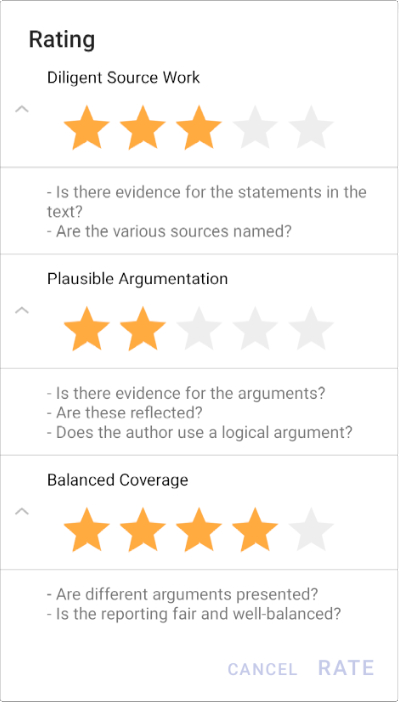Committing Journalism to Quality

The challenge – the foundation of our mission
A functioning democratic society needs high-quality journalism; “it is an eminent ‘factor’ in the formation of public opinion”. BVerfG, 28.02.1961 – 2 BvG 1/60 und 2/60
We believe this principle is under threat from two structural phenomena:
- Ethical dilemma: Media producers have to balance the need to meet their own ethical standards with the need to finance themselves. Many media products are designed primarily with financial interests (paid advertising, clickbait, etc.) in mind which are often not compatible with high-quality journalism.
- Excess: the media consumer is confronted with an almost infinite amount of information that is almost impossible to get a handle on without external control.
This leads to a chain of negative Consequences:
- the media consumer is insufficiently informed about politics and society
- and thus leans more toward a distorted worldview,
- which equates to an individual’s own free will being modified without their control.
This can result in destructive political decisions that are not fully understood by the population, but are nevertheless democratically legitimized. This state of affairs can be viewed as an illegitimate reduction in the power of the people.
„“[T]he radio, like the press, is an indispensable modern means of mass communication which influences and helps shape public opinion. Radio is more than just a ‘medium’ for forming public opinion; it is an eminent ‘factor’ in the formation of public opinion.”
(Federal Constitutional Court (BVerfG) "Broadcasting-Decision" (Rundfunk-Urteil), Feb. 28th 1961, Cases 2 BvG 1/60 and 2 BvG 2/60)
The concept – our solution
COMPPRESS is the answer to these challenges, putting the emphasis on quality and presenting the wealth of information clearly in a single app!
In Theory
- Connecting the motivation for financial gain with the desire to maximize quality so that
- profit is not maximized at the expense of quality and vice versa.
In Practice
- Using a rating system for users where
- news items with good ratings are easier to see in the app, while news items with poor ratings are harder to see, meaning
- better quality news generates more money through more clicks for the media producer, making it
- for the media producer financially worthwhile to produce high-quality news , thereby
- making the quality of journalistic products the most significant financial incentive over time.
This leads to a chain of positive consequences:
- individuals are adequately informed about politics and society
- and thus lean less toward adistorted worldview,
- meaning the individual is more independent in their decision-making process.
The societal implications can be constructive political decisions in the democratic process and, above all, successful democratic control of politics - by influencing the flow of information themselves, the power of the democratic system also remains with the people.
This is how COMPPRESS promotes the press's mission as a watchdog of society.
The COMPPRESS platform
- provides a democratically developed and independent basis for decision-making that allows journalistic products to be used individually
- rewards high-quality publications with higher traffic numbers
- raises the general standard of reporting.
„In this regard, it is legitimately part of the press's job to be the "watchdog of the public" (Rn. 21)."
BGH NJW 2018, 2877

The rating system - your quality guarantee
COMPPRESS is not just another editorial office with its own definition of quality!
The COMPPRESS rating system is based on the values set out in the German Press Code. News items are thus rated according to the standards that the German media landscape has committed itself to!
However, for this international, English language version we have compared the German Press Code with the most prominent international journalistic principles and codes – essentially, the norms and principles are based on the same core values. Therefore, the criteria selected are transferable and the COMPRESS rating system can be applied to international articles as well.
Nevertheless, not all values listed in the German Press Code are suitable for the purposes of a general / non-topic-specific rating system. We took the values of “truthfulness” and “care” as our basis.
In order to convert these two criteria into a rating system, COMPPRESS has assessed their importance based on the specifications of other press codes, including international editions, and based on the latest research into criteria for good journalism. Ultimately, the concept of truthfulness was broken down into the following levels of significance based on the large degree of interpretation it allows, taking into account fundamental philosophical and logical considerations:
- the need to conduct careful research, while at the same time
- developing your own arguments logically and reflecting on these, as well as
- using balanced reporting that takes different perspectives into account.
This process produced the following criteria for ratings:
Diligent Source Work, Plausible Argumentation and Balanced Coverage.
COMPPRESS provides the rating system - you apply it!

